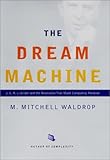It's not solely about the internet but does an awesome job covering the rise of the PC industry and the launch of the internet.
"But that doesn't necessarily and always mean that people couldn't have invented something without military funding and uses in mind."
Sure, it doesn't. But funding and large number of end users combined with price-inelastic demand for your product enable product development and field testing like no other scenario does.
[0] https://en.wikipedia.org/wiki/First_Draft_of_a_Report_on_the...
[1] https://www.amazon.com/Dream-Machine-Licklider-Revolution-Co...
[1] https://www.amazon.com/Dream-Machine-Licklider-Revolution-Co...
IIRC a colleague of von Neumann circulated a technical report by him, where he was summarizing the work of others along with his own, with regard to the stored program architecture. But his name was the only one on it, and the inventors of other machines got pissed off.
There was a rush to patent the idea, and patent litigation. But the idea was never patented, I think because of prior art.
It's interesting to think about what would happen if the idea was patented... I mean it is a significant idea and probably deserves a patent under the law. But would that have set computing history back by a decade or two?
The Dream Machine also goes into some other "inside baseball"... e.g. the relationship between Turing and Church, etc.
[1] https://www.amazon.com/Dream-Machine-Licklider-Revolution-Co...
This one tells the story from the precursors to time-sharing to PARC, using the figure of J.C.R. Licklider as a pivot, and was recommended by Alan Kay as better than Dealers of Lightning. I personally enjoyed both.
https://www.amazon.com/Dream-Machine-Licklider-Revolution-Co...
I have heard Patrick collision talking about this book quite a few times.
Sometimes the rate of technological advance is just staggering.
[1] https://www.amazon.com/Dream-Machine-Licklider-Revolution-Co...
http://www.amazon.com/Dream-Machine-Licklider-Revolution-Com...
It was published in 2001. What do you think of its relevancy 15 years later in the context of our age of "big data" and "Machine Learning"?
- "The LINC Revolution", in "Biomedical Computing" by Joseph November: http://www.amazon.com/Biomedical-Computing-Digitizing-Univer...
- "Computing in the Middle Ages" by Severo Ornstein: http://www.amazon.com/Computing-Middle-Ages-Trenches-1955-19...
- "The Dream Machine" by M. Mitchell Waldrop: http://www.amazon.com/The-Dream-Machine-Licklider-Revolution...
R.I.P.
http://www.amazon.com/Dream-Machine-Licklider-Revolution-Com...
[1] http://www.amazon.com/The-Dream-Machine-Licklider-Revolution...
[2] http://www.mail-archive.com/[email protected]/msg04144.html
[1] http://www.amazon.com/The-Dream-Machine-Licklider-Revolution...
_Dream Machine_ in particular tied together many strands that I had previously explored separately; it's a far-ranging, incredibly well-researched work that covers the development of interactive (and, eventually, personal & networked) computing from its origins at MIT's Whirlwind and Lincoln projects, leading, in big part thanks to J.C.R. Licklider's long-term research (management) vision, to the development of the ARPANET, and, maybe even more importantly, the formation of an "ARPA community", where many of the big ideas were first brought to reality and explored in depth (at BBN, SRI, Utah, PARC &c.).
All in all, it's probably the best history of computing-as-we-know-it-today and a clear recommendation for anyone with just the slightest interest in the idea history of the field.
http://www.amazon.com/The-Dream-Machine-Licklider-Revolution...
_Computing in the Middle Ages_ is a very personal account, supplying the critically important perspective of someone actually working in the trenches in the time-frame covered by _Dream Machine_.
Severo Ornstein co-designed the ARPANET "Interface Message Processors", essentially the first routers. It's also a wonderful history of the LINC (by Wesley Clark et al.), a remarkable (and remarkably forgotten) machine and the direct philosophical fore-runner of all "personal computers".
http://www.amazon.com/Computing-Middle-Ages-Trenches-1955-19...
It's an awesome book about the history of computing, human-computer interaction, and all sorts of things you're familiar with but may never have known where they came from or how they evolved.
http://www.amazon.com/Dream-Machine-Licklider-Revolution-Com...


https://www.amazon.com/Dream-Machine-Licklider-Revolution-Co...